Challenges Casters Face in High-Temperature Scenarios
In the demanding realm of industrial and commercial applications, the selection of appropriate casters is not just a matter of convenience but a critical factor in ensuring operational efficiency and safety. This is especially true in high-temperature environments, where the choice of casters can mean the difference between seamless workflow and costly downtime. High heat scenarios, common in sectors like manufacturing, food processing, and aerospace, present unique challenges that demand specialized solutions.

The primary challenge in such environments is the effect of high temperatures on standard caster materials. Most conventional casters are not designed to withstand extreme heat, leading to issues like material softening, which reduces their load-bearing capacity. Prolonged exposure to high temperatures can also cause deformation, where wheels may lose their shape and hinder mobility. In worst-case scenarios, these conditions can lead to caster failure, where wheels might crack or break under the strain, posing serious safety risks and potentially leading to equipment damage or operational delays.
Understanding these challenges is crucial in choosing the right high heat casters. The ideal caster must not only resist temperature-induced damage but also maintain its functional integrity, ensuring smooth, reliable movement even in the most demanding conditions. As we delve deeper into the world of high temp casters, it becomes evident that the right choice can significantly elevate the performance and safety standards of any high-temperature application.
In the following sections, we will explore some of the best high heat caster options available, each tailored to meet the rigorous demands of high temp environments, ensuring your operations stay rolling smoothly, no matter the heat.
Best High Heat Casters
A. Phenolic Casters
페놀 캐스터 stand out as a premier choice for environments where high temperatures are a constant challenge. These casters are renowned for their exceptional heat resistance, capable of enduring temperatures up to 280℃. This impressive threshold is achieved through the use of phenolic resin, a material known for its thermal stability and durability under stress.
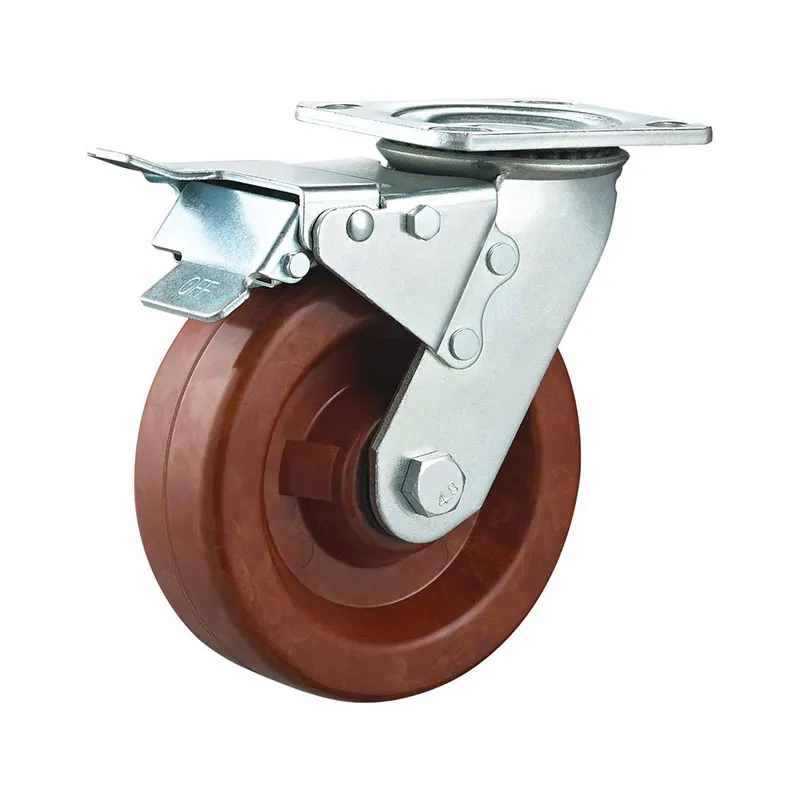
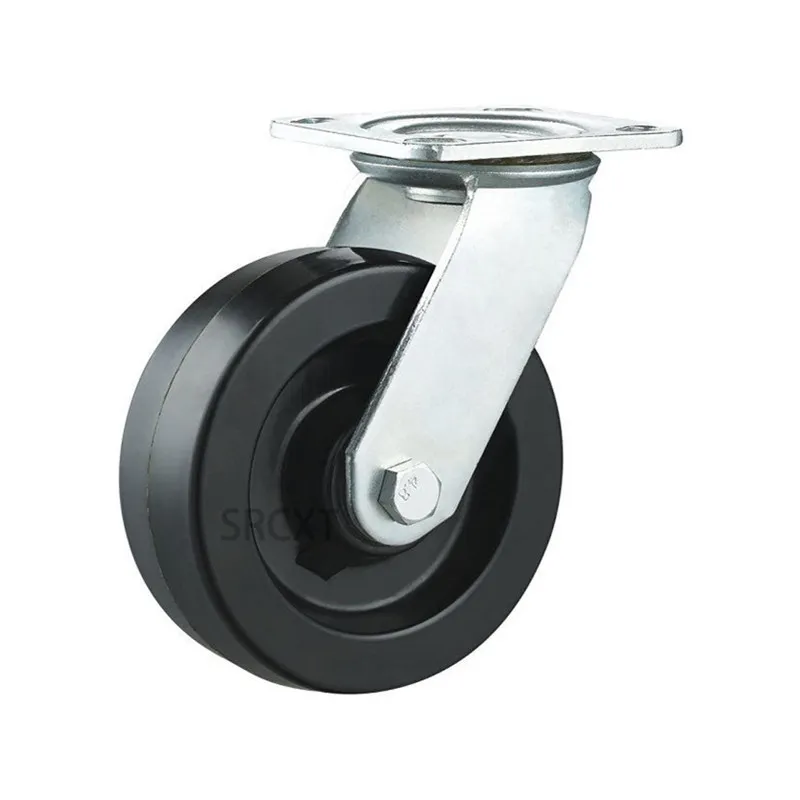
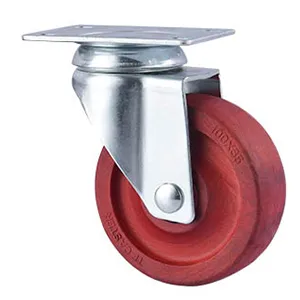
The composition of phenolic casters provides not only heat resistance but also resistance to a range of chemicals, making them ideal for use in chemically intensive environments like laboratories or manufacturing plants. Their hard texture ensures minimal wear even under heavy loads, making them a reliable choice for industrial applications. Additionally, these casters are often sought after for their noise-reducing qualities, contributing to a quieter and more pleasant working environment.
In terms of applications, phenolic casters are well-suited for use in bakeries, autoclaves, and other high-temperature processing areas where their heat-resistant properties are essential. Their ability to withstand rigorous cleaning processes also makes them a hygienic option, vital in food processing and healthcare industries. Overall, phenolic casters provide a blend of durability, temperature resistance, and versatility, making them an excellent choice for a wide range of high heat scenarios.
B. Silicone Heat-Resistant Casters
Silicone heat-resistant casters are another top contender, especially in scenarios where high temperatures are coupled with a need for a softer tread. Capable of withstanding temperatures up to 200°C, these casters are a testament to the versatility of silicone as a heat-resistant material. The silicone tread offers a unique balance of heat resistance and cushioning, reducing noise and vibration, thus protecting delicate cargo during transport.
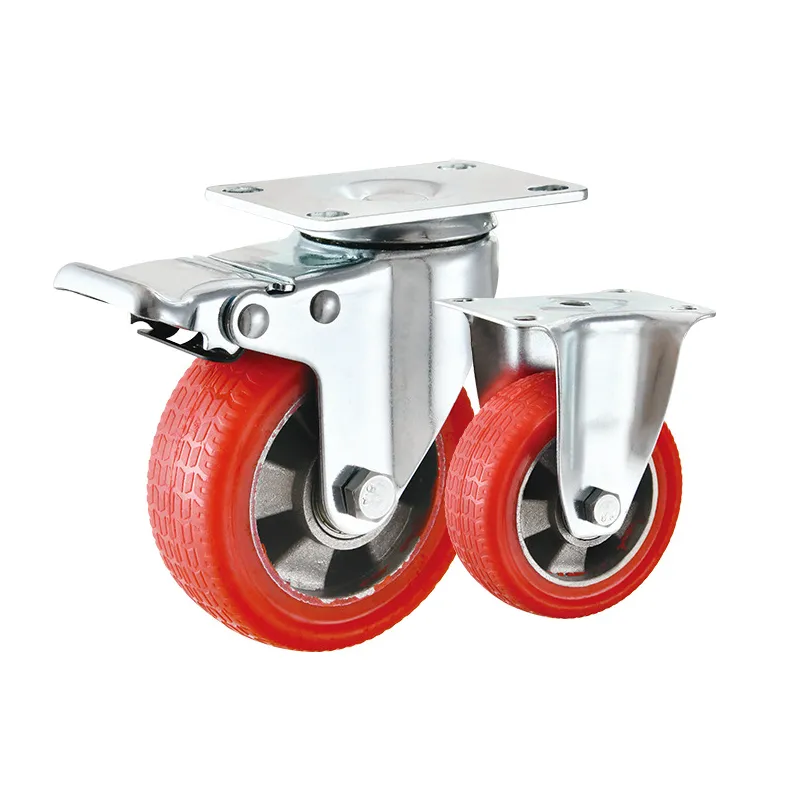
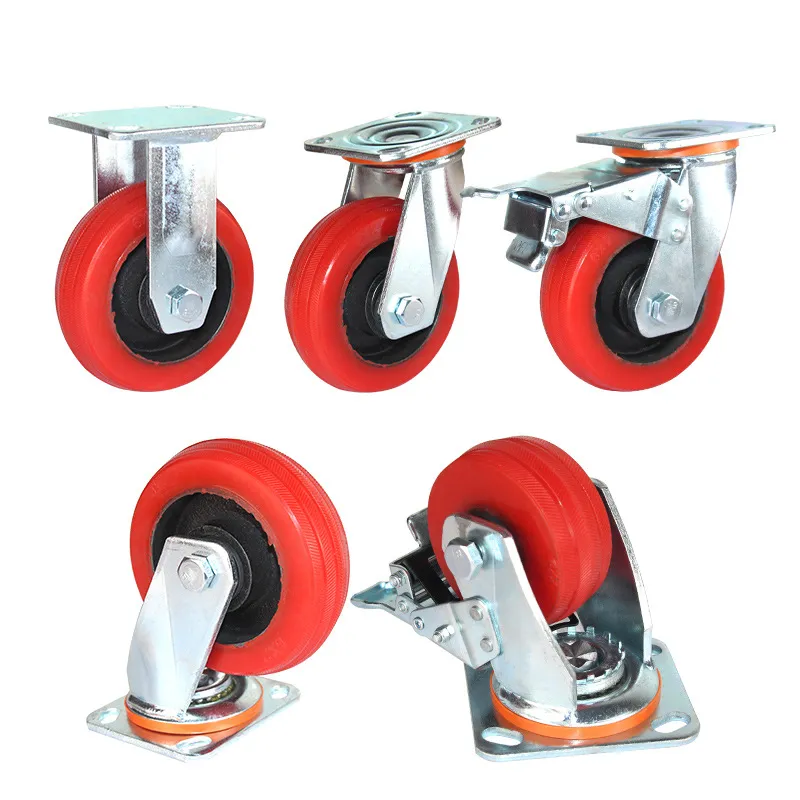
A distinctive feature of silicone heat-resistant casters is their food-grade material, making them a safe and hygienic choice for environments like commercial kitchens, ovens, and food processing units. Their non-marking nature ensures floors remain clean and unscathed, a critical consideration in pristine environments.
These casters are not just limited to the food industry; they also find extensive use in pharmaceuticals, electronics manufacturing, and other sectors where gentle yet durable wheel material is needed. Their soft tread allows for smooth operation on uneven surfaces, making them ideal for carts and mobile equipment in various settings.
C. Steel Casters
스틸 캐스터 are synonymous with strength and resilience, especially in high-temperature conditions. Known for their robust construction, these casters can endure extreme temperatures, making them a solid choice for 무거운 의무 industrial applications. The key to their high heat resistance lies in the steel’s inherent properties, which maintain structural integrity and load-bearing capacity even under intense heat.
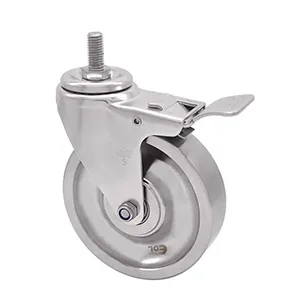
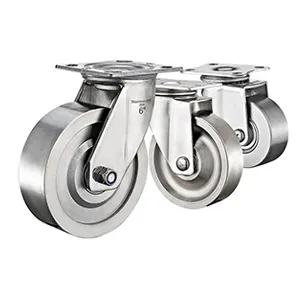
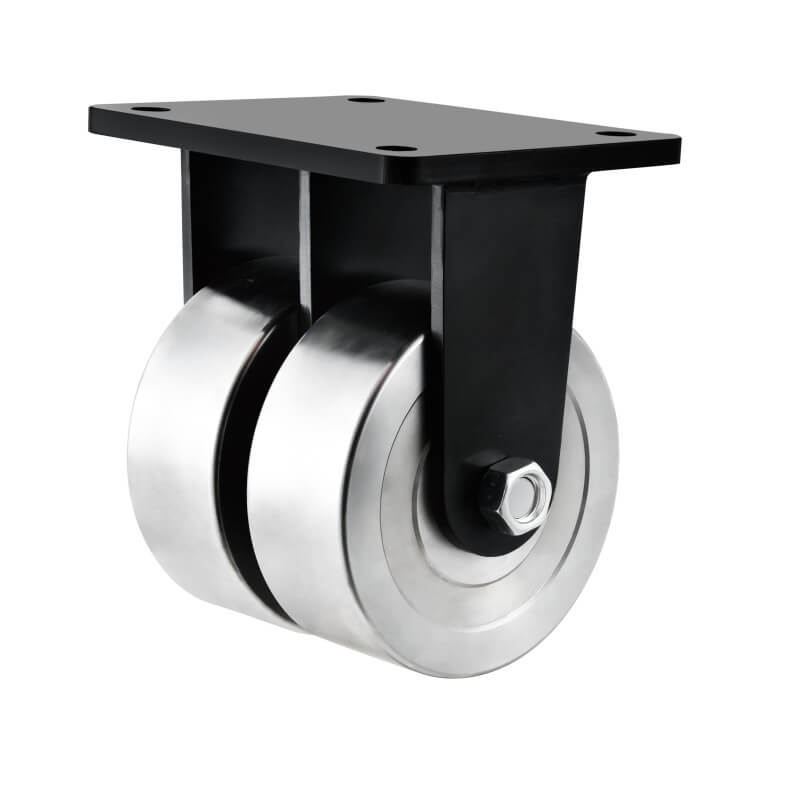
The durability of steel casters is not their only strong suit. They are also resistant to water, chemicals, and impacts, making them suitable for harsh industrial environments. Their hard wheel surface ensures smooth mobility on flat surfaces, ideal for transporting heavy machinery and materials.
In terms of temperature limits, steel casters can handle various ranges, making them versatile for different industrial settings, such as metalworking facilities, automotive manufacturing, and foundries. Their ability to withstand frequent temperature fluctuations without degrading makes them a reliable choice for businesses seeking long-term caster solutions.
D. Cast Iron Wheels
Cast iron wheels are the epitome of traditional strength and reliability in caster technology. Revered for their high temperature resistance, these wheels can handle extreme heat without losing their shape or functionality. The robust nature of cast iron makes it resistant to not just heat but also to abrasions, impacts, and continuous use.
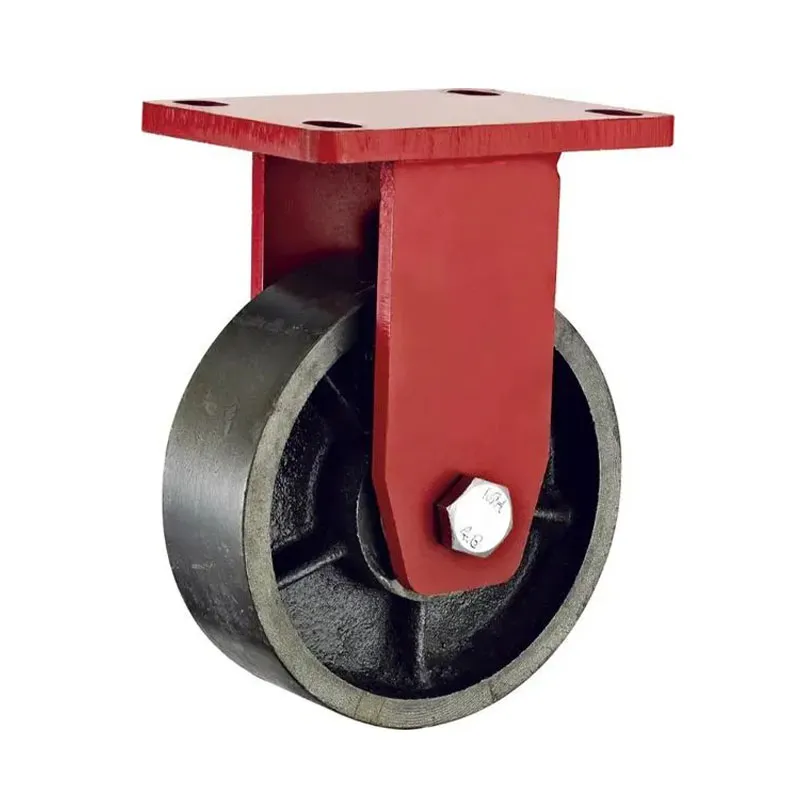
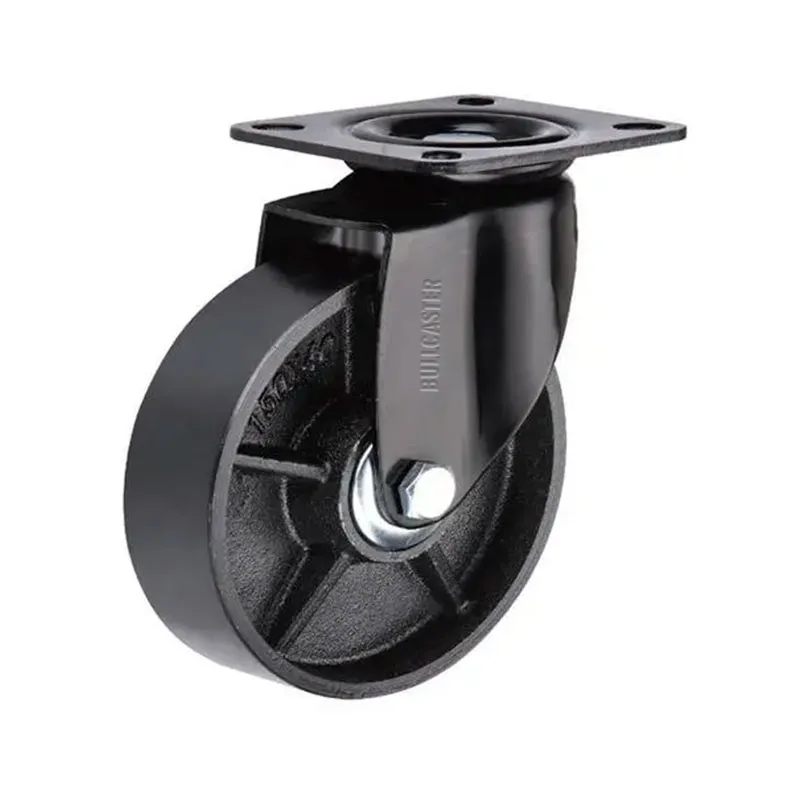
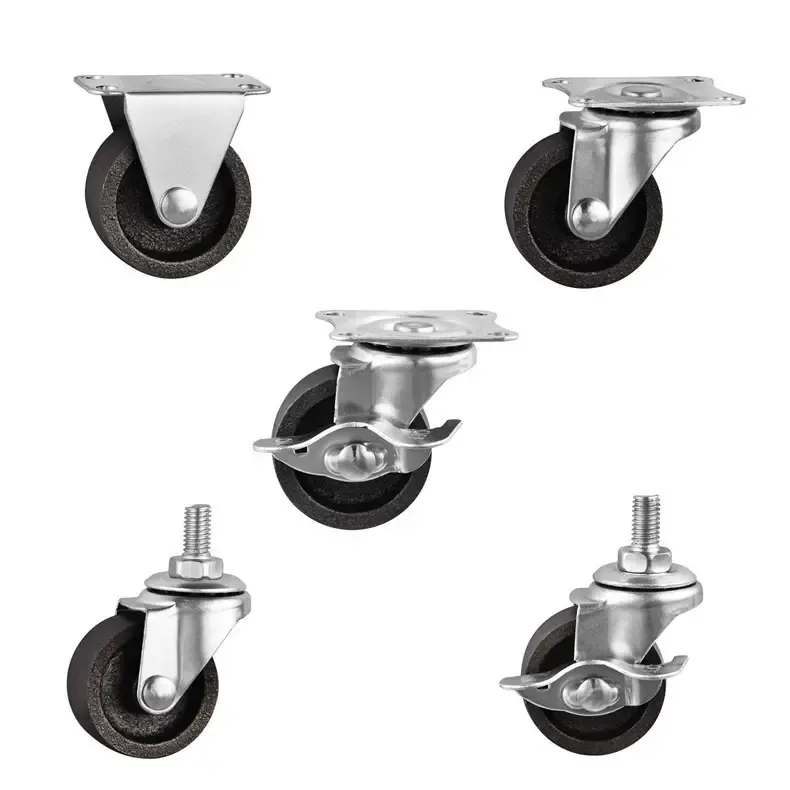
An important feature of cast iron wheels is their load-bearing capacity. These wheels are capable of supporting substantial weights, making them ideal for heavy industrial applications where reliability under load is a non-negotiable requirement. Their hard tread ensures minimal rolling resistance, allowing for easier movement of heavy loads.
Typical applications for cast iron wheels include industrial ovens, foundries, and other high-temperature environments where other materials might fail. They are also widely used in outdoor applications, thanks to their resistance to environmental elements. Despite their rugged nature, it’s important to note that cast iron wheels may require more maintenance in terms of lubrication and surface protection, especially in corrosive environments.
결론
As we conclude our exploration of the best high heat casters for extreme temperature environments, it’s clear that choosing the right caster is crucial for maintaining efficiency, safety, and longevity in demanding industrial settings. Whether it’s the resilient phenolic casters, the versatile silicone heat-resistant casters, the robust steel casters, or the traditional cast iron wheels, each type offers unique benefits tailored to specific high temp scenarios.
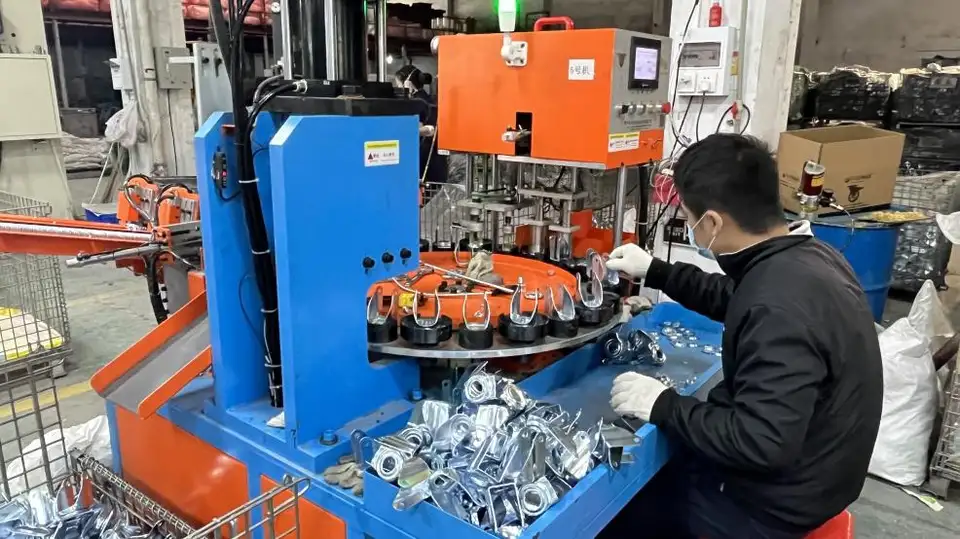
~에 불캐스터, we understand the critical role that high-quality casters play in your operations. Our extensive range of high heat casters is designed to meet the diverse needs of various industries, ensuring that no matter the temperature or application, we have the right solution for you.
Reach out to us today for a consultation and discover how Bullcaster can elevate your high temp applications. Whether you’re ready to place an order or simply seeking advice on the best caster options, we’re here to help. Contact us now.
FAQs
Q1: What makes high temperature casters different from regular casters?
A1: High-heat casters are specifically designed to withstand extreme temperatures without losing their structural integrity. They are made from materials like phenolic resin, silicone, steel, or cast iron, which resist softening, deformation, and breakage under high temperatures, unlike regular casters.
Q2: Can phenolic casters be used in food processing environments?
A2: Yes, phenolic casters are suitable for food processing environments due to their chemical resistance and durability. However, for direct food contact applications, food-grade casters like silicone heat-resistant casters are more appropriate.
Q3: Are silicone heat-resistant casters durable enough for industrial use?
A3: Absolutely. Silicone heat-resistant casters are designed to be both durable and flexible. They can withstand temperatures up to 200°C and are suitable for various industrial applications, especially where a softer tread is beneficial.
Q4: Can high heat casters also handle heavy loads?
A4: Yes, most high heat casters, especially steel and cast iron wheels, are designed to handle heavy loads without compromising performance, even in high-temperature conditions.
Q5: Does Bullcaster offer custom solutions for unique caster needs?
A5: Certainly! At Bullcaster, we specialize in providing custom caster solutions tailored to your specific requirements. Whether it’s unique dimensions, materials, or load capacities, we can design casters that perfectly fit your needs.
Q6: How do I choose the right high heat caster for my application?
A6: Choosing the right caster depends on several factors, including the temperature range, load capacity, and the specific environment in which the caster will be used. Our experts at Bullcaster can help guide you through the selection process to ensure you get the most suitable caster for your application.


